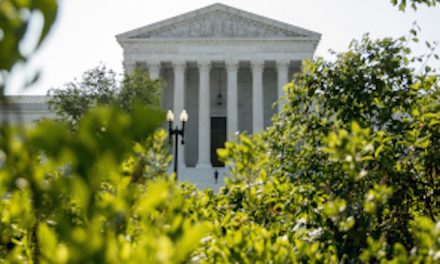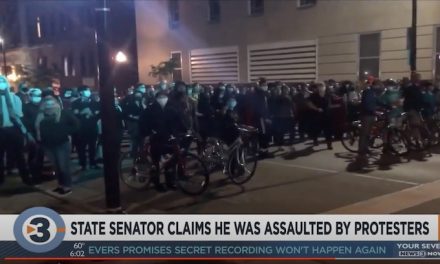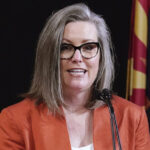A state representative has introduced a proposal for an amendment to the Connecticut Constitution that would grant non-citizens the right to vote in state and municipal elections — he knows it will fail.
For Rep. Juan Candelaria of New Haven, the purpose of the proposal is not to have it pass, but to lay the groundwork for future policy in a state that is home to 240,000 non-citizen immigrants, approximately half of which are undocumented.
More than a dozen localities in the United States have passed laws allowing non-citizen electors in municipal or school board elections in a growing suffrage movement that has faced fierce criticism from opponents.
While state lawmakers have expanded protections and privileges for Connecticut’s immigrants, the last big discussion on non-citizen voting occurred in 2011, when former New Haven Mayor John DeStefano attempted to lobby the legislature to let undocumented immigrants vote in city elections.
Candelaria is ready to reignite the debate.
“When we talk about undocumented individuals, they are part of our fabric of this nation and of the state. … They’re part of the community and they should have a voice,” Candelaria said. “People might not be amicable to this idea, and I respect that opinion, but at least by having the process, we can have the dialogue and we can have the debate. And that’s all I want.”
In its current rough draft, the proposed amendment would “allow undocumented immigrants who are residents of the state to be admitted as electors for purposes of voting in municipal and state elections,” but Candelaria said that the policy would extend to visa-holders and lawful permanent residents. Candelaria said the completed proposal will stipulate a list of requirements including the minimum number of years a person must live in the state in order to qualify as well as bars on those with a criminal record.
Candelaria acknowledged that the idea of non-citizen suffrage faces opposition from lawmakers on both sides of the aisle, but he hopes his proposal will at least lead to an open debate in a public hearing.
“If I can get all the way to the floor of the House, that’ll be the ultimate goal for me. But it’s not going to happen,” Candelaria said.
The survival time of the proposed amendment will depend on how it is handled in the General Assembly’s Government Administration and Elections Committee where legislators will first vote on whether to raise the bill for discussion.
House Minority Leader Rep. Vincent Candelora is of the mind that the proposal should not make it to the stage of a public hearing.
“I think it’s completely outrageous. I think that the fact that we have open borders and now we are potentially opening up elections to non-citizens completely erodes our sovereignty in this country and in our state,” Candelora said. “I don’t think that we should be redefining who an elector is at the municipal or statewide level for the purposes of electing our public officials.”
State Rep. Matt Blumenthal, chair of the Government Administration and Elections Committee, said that the committee has yet to screen new proposals and that he could not comment on Candelaria’s proposed constitutional amendment. He also declined to share his thoughts on non-citizen voting.
“Our colleagues in the General Assembly have proposed roughly 150 ideas for bills to be handled by our committee,” Blumenthal said. “My co-chair [Sen. Mae Flexer] and I look forward to reviewing them all and discussing whether they should go forward in the committee.”
Even if the proposal makes it out of committee, and is approved by the General Assembly, it would take years — with many opportunities for failure — before becoming policy.
In order to amend Connecticut’s Constitution, three-fourths of representatives from the House and the Senate would need to approve the resolution before appearing on voters’ ballots for final passage in the next regular state election.
Another path toward amendment occurs if a simple majority of state senators and representatives pass the resolution. In that scenario, the proposed amendment would undergo a second vote by legislators during the following year’s session, and if that reaches a simple majority, the proposal will appear on the general election ballot.
Candelaria is optimistic that once the conversation starts, non-citizen voters will become a reality for Connecticut within the next decade.
“If we get members to agree that it makes sense for them [and] for the communities, hopefully I can see this happening in the next couple of years,” Candeleria said. “That’s my wishful thinking, but at least let’s begin the process of having a dialogue.”
Non-citizen voting a historical norm
Non-citizen suffrage is not so much a new idea as it is a historical norm.
Thirty-nine U.S. states permitted “Alien Suffrage” for local, state and federal elections between 1776 and 1926. High demand for labor from an immigrant workforce kept the practice strong until the turn of the 20th century when nativist sentiments and anti-immigrant fears spurred by World War One finally won over.
Connecticut however outlawed non-citizen electors with the passage of the state’s first constitution in 1818, granting the right only to “white male citizen[s] of the United States.”
The U.S. government did not explicitly prohibit non-citizen voters in federal elections until the Illegal Immigration Reform and Immigrant Responsibility Act of 1996.
“Citizenship as a requirement for voting, historically hasn’t been the norm in the U.S.” Roger Senserrich, the communications director of the Connecticut Working Families Party said.
Senserrich said that the WFP is a strong supporter of allowing non-citizens to vote in municipal elections, adding that it is one of the questions the party asks candidates before giving them an endorsement.
Currently, 11 municipalities in Maryland, and two Vermont cities permit non-citizen voters in local elections. In 2021, New York City passed a law allowing non-citizen voters on the local-level, but the policy was struck down by a judge last June before it could take effect.
Other cities, like Oakland, California, allow non-citizen parents of school children to vote for School Board Director. Several other non-citizen suffrage proposals are cropping up in towns across the country.
Sensirrich thinks Connecticut should join the list.
“We are a state that has always been very proud of our diversity and we have this strong tradition of a very strong local self rule. Considering that quite a few of our cities and towns have big immigrant populations, they should have a say,” Sensirrich said. “If we value local self-government, we should value local self-government by everyone that lives in that town, not just the few.”
Rights and protections for undocumented immigrants have been growing in Connecticut. Over the last decade, the legislature has passed more than a dozen laws benefiting undocumented immigrants.
Some of the most notable include the issuance of drive-only licenses in 2013, granting eligibility for financial aid at the state’s public higher education institutions in 2018, and most recently, extending Connecticut’s HUSKY Medicaid program to all children under age 12.
Constanza Segovia is community organizer at the immigrant-led mutual aid group Hartford Deportation Defense, one of the many organizations leading the fight to expand HUSKY to all residents, regardless of age or immigration status.
Segovia said that granting non-citizens the right to vote is important, but says undocumented immigrants have taken up other tools to gain a political voice.
“Voting is one of the big ways that we become civically engaged, but that’s not the only way,” Segovia said. “Our communities are already engaged with our leaders. With the ‘Husky 4 Immigrants’ campaign right now, we’re at the Capitol, we’re talking to legislators, we’re talking to legislators about our communities and the needs [of not] just the immigrant communities that we belong to, but also our Hartford community, our Hartford neighborhoods, our Hartford schools. Voting is just one aspect of civic engagement. I think having access to vote would give us another tool.”
Segovia said that the inability to be engaged in the voting process has been a huge “disparity” for her community and “a missing piece in our current democratic system.”
She that it’s time for the public to redefine what it means to be a citizen.
“We’re all next door to each other, we’re all going to the same schools, we’re going to the same hospital, so how are we going to look beyond some of these barriers and actually come up with some solutions so that everybody has access to fair wages, good education, good housing, basic health care?” Segovia said. “When we talk about being citizens of the world and being citizens of the community that we live in … that includes everybody who lives in this community and has a stake in this community. And I wish that we get to a point with our government where people can be treated as such.”
As for whether she thinks Connecticut will ever grant non-citizens the right to vote, Segovia said, “You have to start the conversation to know whether it’s possible.”
- Alison Cross
©2023 Hartford Courant. Visit courant.com. Distributed by Tribune Content Agency, LLC.
—-
This content is published through a licensing agreement with Acquire Media using its NewsEdge technology.



















VERY BAD IDEA
Why do you think the DEMS ARE all for it!
To allow non-citizens to vote in elections is stupid and would be a extremely BIG mistake. Only USA citizens voting is essential for the country.
IF Anything allowing non citizens to vote, SHOULD be criminal!
BUT we know the left CARES not.
In the days of St. Paul, being a Roman Citizen saved him from death, stoning, and decapitation on many occasions. Roman citizenship meant something in those days. Today illegal foreigners , get free medical service, free food, free housing, free legal defense and pretty much the same privileges, (Thanks to Past Liberal Courts) that are afforded to LEGAL American born citizens. The sacred freedom protecting right to vote is just about the last bastion of American citizen protection, and if you give that one away to people of illegal intentions who have already broken our laws to get into America, you can bet the Constitution that all the rest of its citizen guarantees will disappear as well, and the Democrat MAGA plans for Making America Mediocre Again will be the end of the last best hope of mankind, and the Legal citizens will begin to suffer the same foreign deaths, stoning’s, and decapitations the illegals fled from, that St, Paul was able to avoid, long enough for him to add precious life giving books to the Bible.
And with how many states now, give illegals voting rights too, THERE ARE JUST NO RIGHTS LEFT< for True citizens.. So what point is there for Anyone to BOTHER getting citizenship??!?!?! Not a damn one.
We’re slowly losing our country. The GOP best better wake up.
EVEN IF THEY act now, CAN THEY DO ENOUGH, to save it??
And so it begins… the onslaught of non-citizens who need the government dole to survive get the right to put them in office. It starts with the cities, then the states, and finally the whole country. An all-out effort for a single party system, just like falling dominos. Once that happens, and the earners in society learn that it doesn’t pay to work hard because it’s only going to be given away, will our society then crumble.
Of course, the home states (countries) of these illegal border-crossers will be happy to allow residents of Connecticut to vote in their elections.
I wonder, how many STILL LET THEIR “illegals”, vote back home?
“And so it began …”
You also gotta wonder, IF THEY “let them vote locally’, SINCE MOST EVERY TIME i’ve voted, its doing BOTH LOCAL/State ballots AND FEDERAL ONES at the same time, HOW exactly will they ensure these invaders, are NOT VOTING FEDERALLY!?!?!?!?!?
these states should be removed from federal elections period.
I have often wondered, WHY when a state KNOWINGLY AND WILLFULLY VIOLATES federal law, like this, THEY STILL get to have ANY Representation in congress!?!? REMOVE THEM from Congress, BOTH the house AND SENATE. as long as they have these laws in place.
Illegals.are citizens of the U.S. Or the state they illegally live in .
A Democrat basing proposed legislation on the norms of the past is not the norm.
If ICE will do their job as required by law, we can get rid of illegal invaders quickly.
These days, name ONE govt agency that IS DOING THEIR JOB Properly?